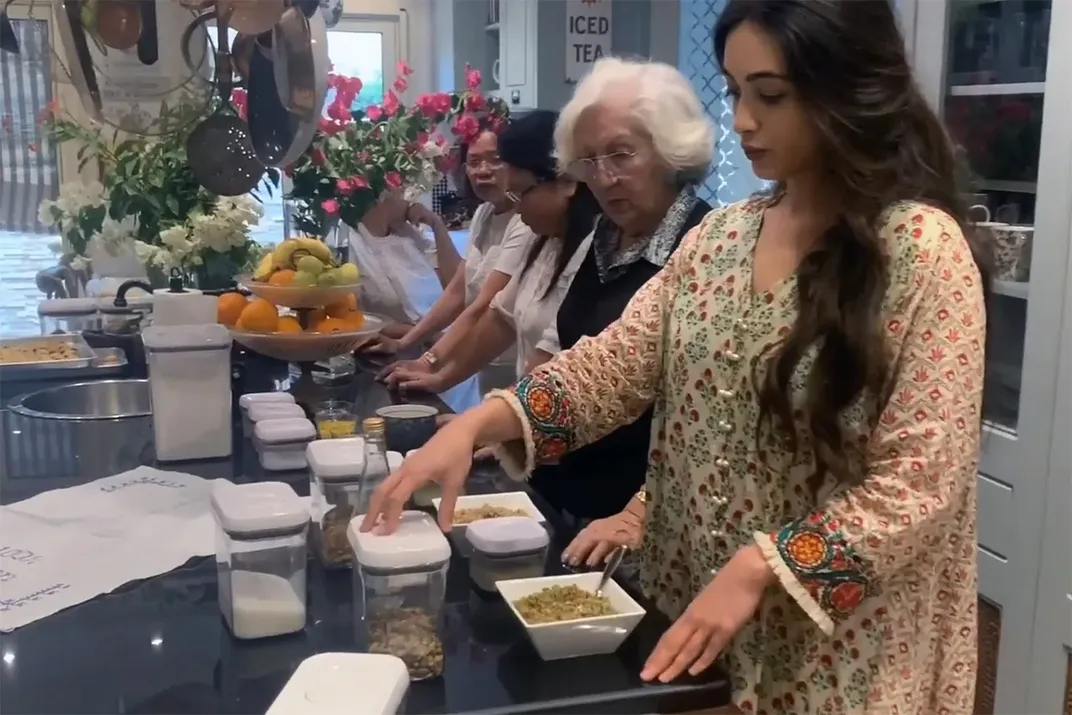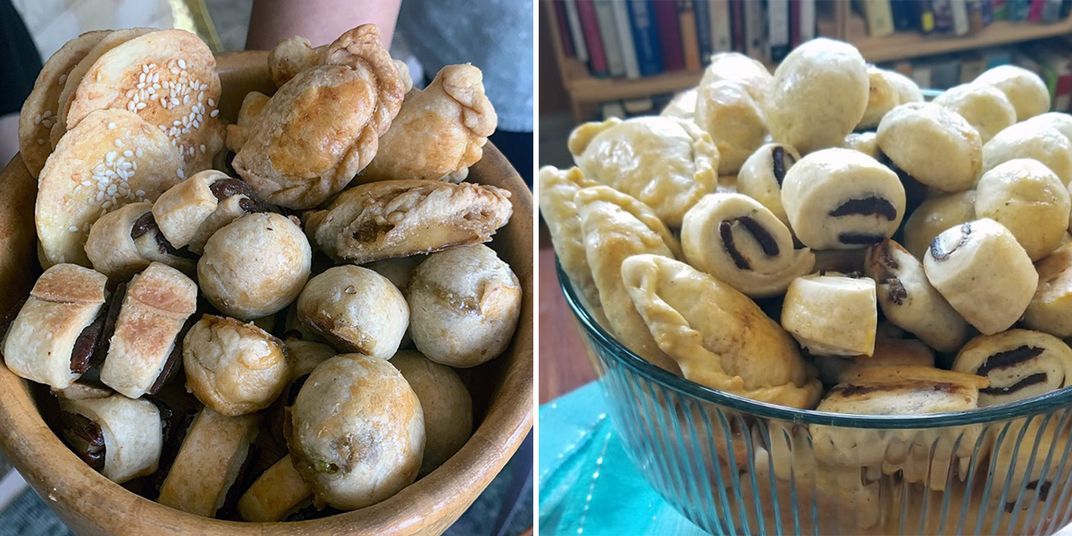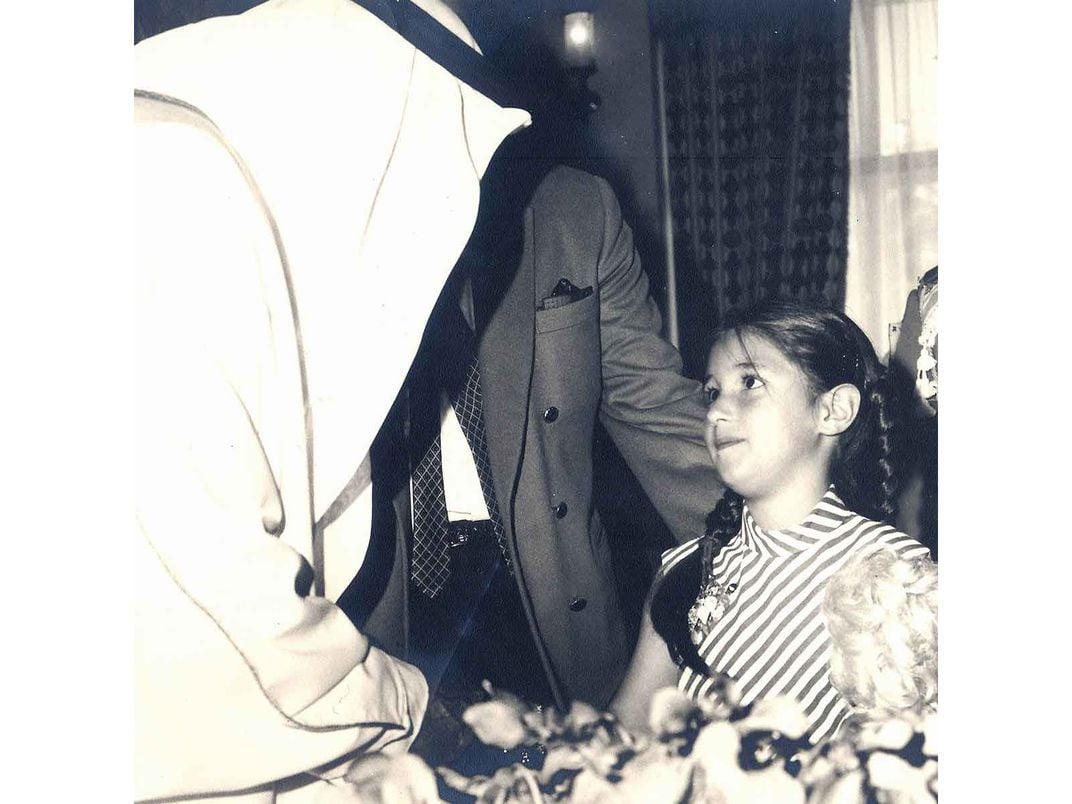How to Make the Ancient Iraqi Cookie that Signals the End of Ramadan
Made with rosewater, nigella seed and stuffed with dates or nuts, the bite-size ‘kleicha’ evokes layers of meaning and memory
/https://tf-cmsv2-smithsonianmag-media.s3.amazonaws.com/filer/da/36/da361033-6287-4fb4-b714-0b216041f1a7/kleicha-piles.jpg)
Born in Baghdad, Reem El Mutwalli arrived in Abu Dhabi in 1968 at the age of five. Her childhood coincided with the early days of the United Arab Emirates, which was founded in 1971. Today, El Mutwalli is a cultural heritage professional, designer, dress historian and founder of The Zay Initiative, a nonprofit collection and digital archive of Arab dress.
El Mutwalli carries on an ancient Iraqi food tradition from her kitchen in Dubai—kleicha, or date cookies. Fragrant with rosewater and nigella seed and stuffed with dates or nuts, kleicha speak to Iraqi heritage and holiday customs. “It’s a collection of memories, more than just a pastry, I think,” she says.
In the El Mutwalli family, kleicha also tell the story of this multi-national, multi-generational, multi-faith household and the place they have made in their adopted country. For El Mutwalli, kleicha evoke layers of meaning and memory. “My mother, Buthaina Al Kadhi, baked kleicha for special occasions, especially during the last few days of Ramadan, to be enjoyed during Eid.”
Eid al-Fitr, the three-day holiday that marks the end of Ramadan, ushers in joyous celebrations after 30 days of fasting and devotion. During Eid, Muslims visit friends and family members in their homes, exchanging blessings, gifts and delicacies. Across the Arab world, families show hospitality by serving coffee and tea, dried dates, sweets and plenty of food. “Kleicha are always, always made for Eid,” El Mutwalli explains. “Every Iraqi household will make and serve them, each a little bit different from the other.”

The El Mutwalli Family Kleicha
by Aida Roncales Tenedero, adapted by Kathy Phung
Notes from the test kitchen: You need one batch of dough per filling, but each batch of dough yields from 28 to 50 cookies, depending on the shape and size. The shapes of the cookies are suggestions to differentiate them from each other. Kleicha can be easily frozen and reheated in an oven or toaster oven to enjoy later.
Ingredients
Dough
3 cups all-purpose flour
1/2 teaspoon salt
1 teaspoon yeast
1 teaspoon ground cardamom
1 egg
1/2 cup melted butter
1/2 cup neutral oil
3/4 cup waterDate Filling
2 tablespoons neutral oil
1 kilo (2.2 pounds) dates, pitted
1/2 teaspoon ground cardamomPistachio Filling
200 grams (7 ounces) raw pistachio, finely ground
3/4 teaspoon rosewater, or to taste
1 1/2 teaspoon sugar, or to tasteWalnut Filling
200 grams (7 ounces) raw walnuts, finely ground
3/4 teaspoon rosewater, or to taste
1 1/2 teaspoon sugar, or to tasteSavory Cheese Kleicha
3 cups all-purpose flour
1/2 teaspoon salt
1 teaspoon yeast
1 egg
1/2 cup melted butter
1/4 cup neutral oil
3/4 cup water
200 grams (7 ounces) shredded mozzarella cheese
200 grams (7 ounces) shredded cheddar cheese
1 cup sesame seeds2 whole eggs, beaten, for glaze
Preparation
Dough:
In a medium mixing bowl, mix the flour, salt, yeast, ground cardamom, egg, melted butter, oil and water into a soft dough. Cover and let rest for 30 minutes.Date filling:
Place pitted dates, oil and cardamom into a small pot over low heat. Heat the dates just enough to help with the mashing; the dates should not cook. Remove from heat and continue to mash with a masher or your hands until a smooth paste forms. While still warm, place date paste in a large plastic food storage bag, or between two sheets of parchment paper, and roll into a thin sheet.Pistachio and walnut fillings:
Using a food processor, grind pistachios until fine. Add sugar and rosewater and mix well. Set aside. Repeat the process with walnuts.Date kleicha:
Take a softball-size piece of dough and roll out to into a large, thin rectangle. Slice ribbons of date filling approximately 1 inch thick. Place one ribbon of date filling along the long edge of the dough, adding more date filling as needed. Gently fold the edge and paste over itself. Repeat by placing another length of date filling on top of the folded edge, and fold over once more. (Watch the video at top to see the El Mutwalli rolling technique.) Cut the dough approximately 1 inch from the filled portion, and fold the dough over once more. Trim the edges of the log, then cut the cookies into 1 1/2-inch pieces. Place cookies on a parchment-lined sheet tray and brush with egg yolk.Bake in a preheated 375°F oven for 15 to 18 minutes, or until golden brown.
Pistachio kleicha:
Take half-a-tablespoon piece of dough and roll into a small ball. Flatten into your palm, and fill with a scant teaspoon of pistachio filling. Pinch the edges close and roll into a smooth ball. Place cookies on a prepared sheet tray and continue like date cookies.Walnut kleicha:
Take a tablespoon piece of dough and roll into a small ball. Flatten into your palm and fill with a rounded teaspoon of walnut filing. Fold edges together into a half moon, and crimp the edges closed with your fingers or a fork. Place cookies on a prepared sheet tray and continue like date cookies.Savory kleicha:
In a medium mixing bowl, mix the flour, salt, yeast, egg, cheese, melted butter, oil and water into a soft dough. Cover and let rest for 30 minutes. Roll out into a sheet about 1/4-inch thick and cut to desired size with a round cutter or cutter of choice. Place on a prepared sheet tray, brush with egg yolks and sprinkle with sesame seeds.Bake in a pre-heated 375°F oven for 12 to 15 minutes, or until golden brown.

Beginning in the 1970s, her mother’s kleicha had become renowned in social circles in Abu Dhabi. El Mutwalli began to send out the homemade pastries as gifts for Ramadan and Eid more than 15 years ago. The tradition grew as more friends, relatives and colleagues looked forward to her annual gifts, and El Mutwalli made larger and larger batches—up to 500 kilos, or about 1,100 pounds—with the help of her entire household.
“I wanted to share something that ties me to Iraq,” she says. “I never lived in Iraq—I don’t have any recollection of Iraq. Yet I grew up hearing my parents’ memories. So I wanted to give something that is associated with that heritage, something that cannot be bought in local shops.”
“To me, the idea of Iraq is a tribute to my mother and an homage to my father. We gave away kleicha on the 40th day after my father passed away a few years ago, for people to remember him, to say a small prayer and think of him, and to celebrate his life on that day. We also make kleicha to remember those who have left us.”
Her late father, Dr. Tariq El Mutwalli, moved his family to Abu Dhabi in 1968 to serve as economic advisor to Sheikh Khalifa bin Zayed Al Nahyan, now the president of the UAE. El Mutwalli remembers, “He brought his two brothers Ghanim and Sabah and their families, and then other relatives, eventually uprooting and re-rooting more than 65 members of the El Mutwalli clan from Baghdad to the UAE to make their home.”

Kleicha is a deeply traditional treat, reaching back to ancient Babylonia. Kleicha feature the fruit of the date palm, one of the earliest cultivated trees and the foundation of the region’s foodways. Iraqis of many ethnicities and religions enjoy kleicha on their special occasions; families pass down their secret recipes. El Mutwalli says, “In our family, my mother passed her kleicha down to my daughter, Mae, and to Aida Roncales Tenedero, our long-time housekeeper, who came from the Philippines to live with us when Mae was born. Over the years Aida has taught Mae, as well as other household staff, how to make kleicha. And Aida has added her own creativity to the preparation.”
Buthaina Al Kadhi and Roncales Tenedero work by eye and taste, rather than written recipes, to make the bite-sized pastries. Al Kadhi is the expert on the authentic flavor and appearance. El Mutwalli explains, “It is my mother who has a great influence on how we make it and if it tastes good or not, if it has enough rosewater, it has enough sugar, it’s too crispy, it’s too fluffy. She’s the one who decides on all that.”
Roncales Tenedero oversees the baking process from preparing the date, pistachio and walnut fillings, measuring cardamom and rosewater, kneading the dough, forming the pastries and baking them to perfection. Next, Reem and her Filipino assistant Cristeta "Dalia" Ardenio prepare the gift boxes. Each year El Mutwalli surprises people with a new presentation for the kleicha. As the household members, both Muslim and Christian, work together, the family’s culinary knowledge passes between generations and across cultures, enriched with Iraqi, Filipino and UAE experiences. Together, they carry forward the kleicha tradition in their adopted home.
In 2020, due to COVID-19 precautions, El Mutwalli did not send out kleicha gifts. However, the family agreed to collaborate with the Smithsonian Folklife Festival team, bringing a new dimension to the tradition: for the first time, the secret of Buthaina Al Kadhi’s recipe and Aida Roncales Tenedero’s techniques have been written down and can circulate around the globe. Kathy Phung, the Smithsonian Folklife Festival’s foodways coordinator, worked with the family to document the tradition in a newly published recipe.
“I was very surprised that you managed to make kleicha out of the recipe,” says El Mutwalli, “because usually Aida doesn’t tell people how she makes them!”
A version of this story originally appeared in the online magazine of the Center for Folklife and Cultural Heritage. Michele Bambling and Rebecca Fenton are curators of the United Arab Emirates program for the Smithsonian Folklife Festival.

